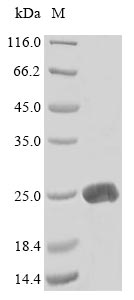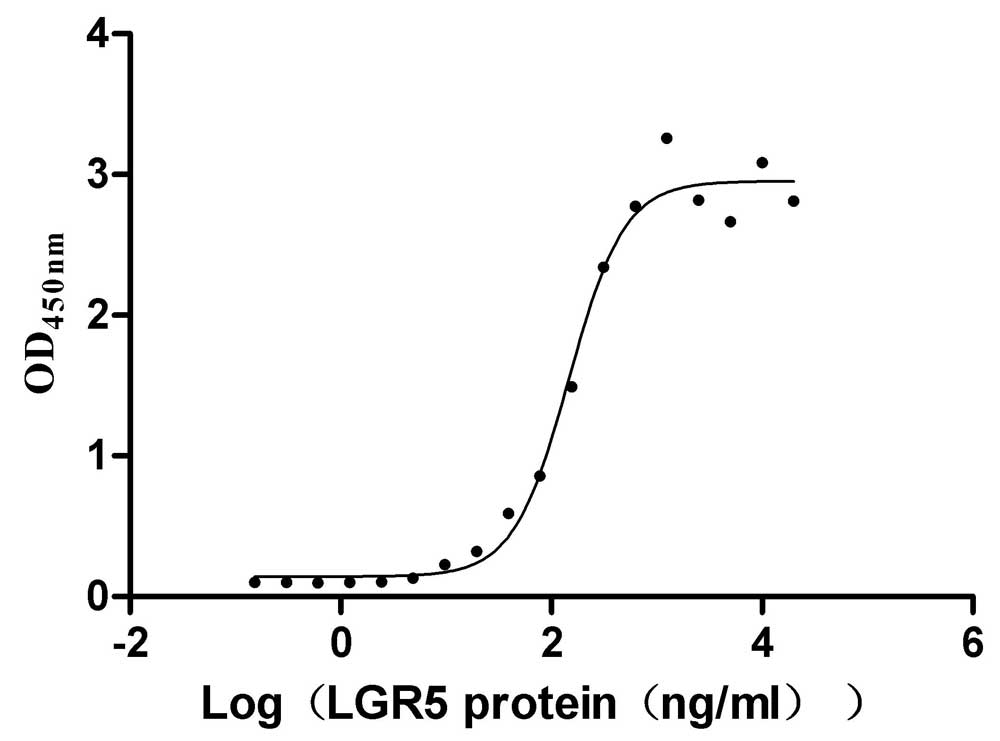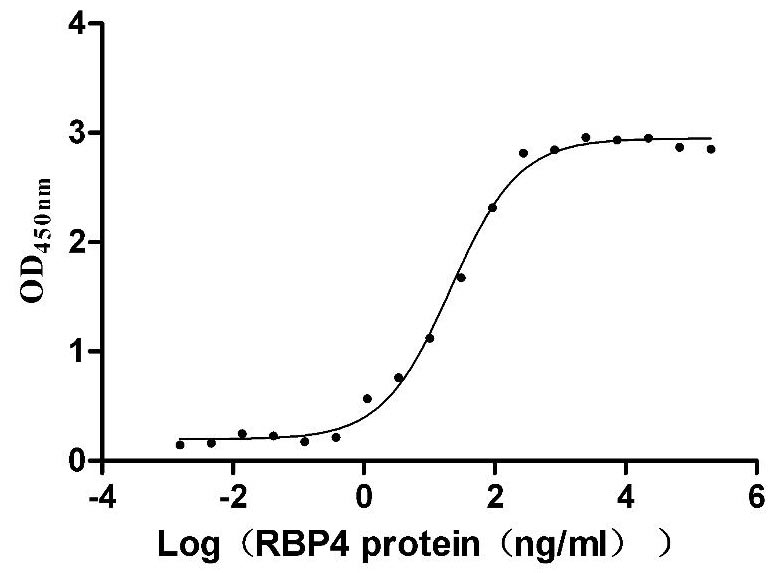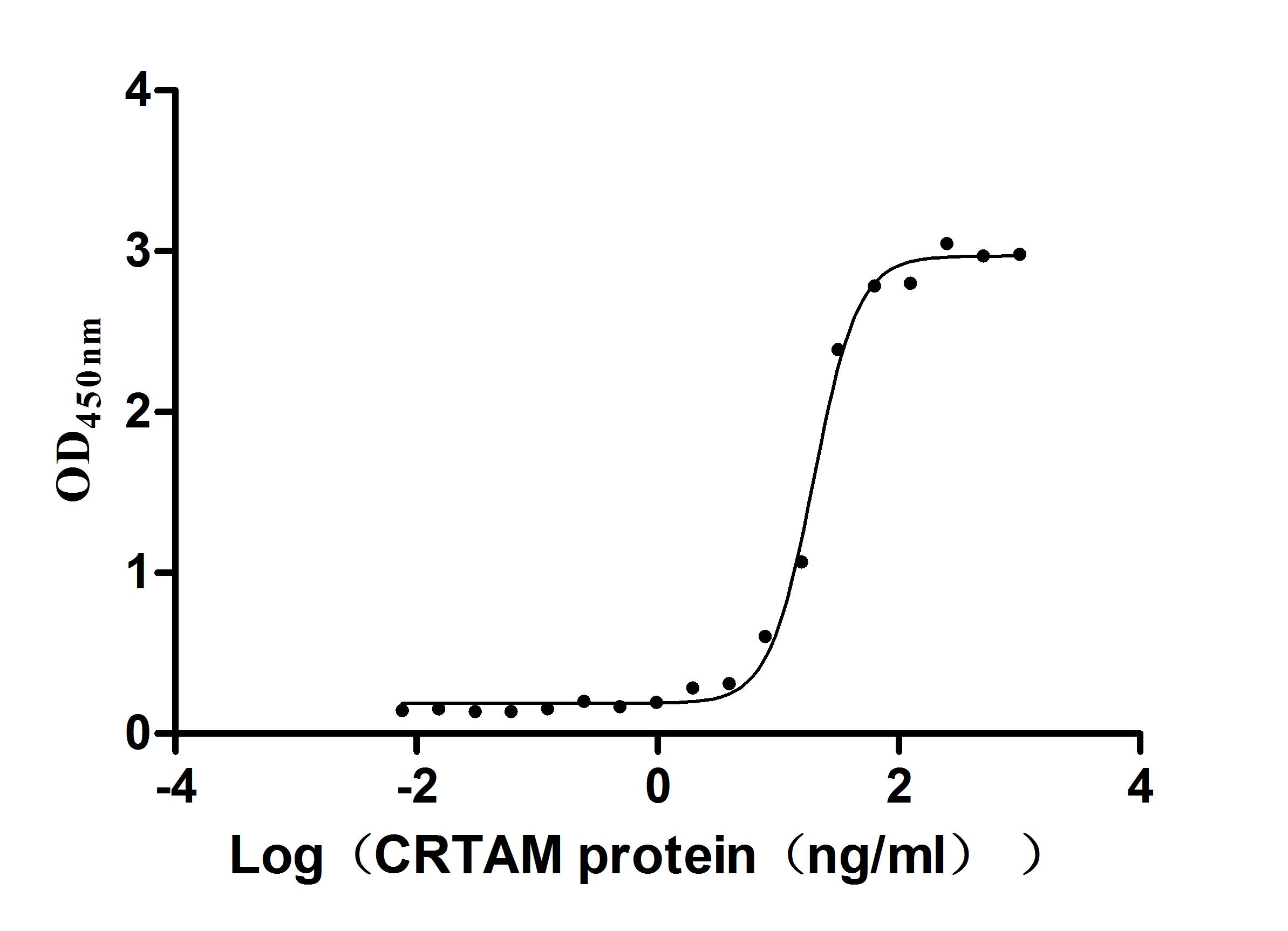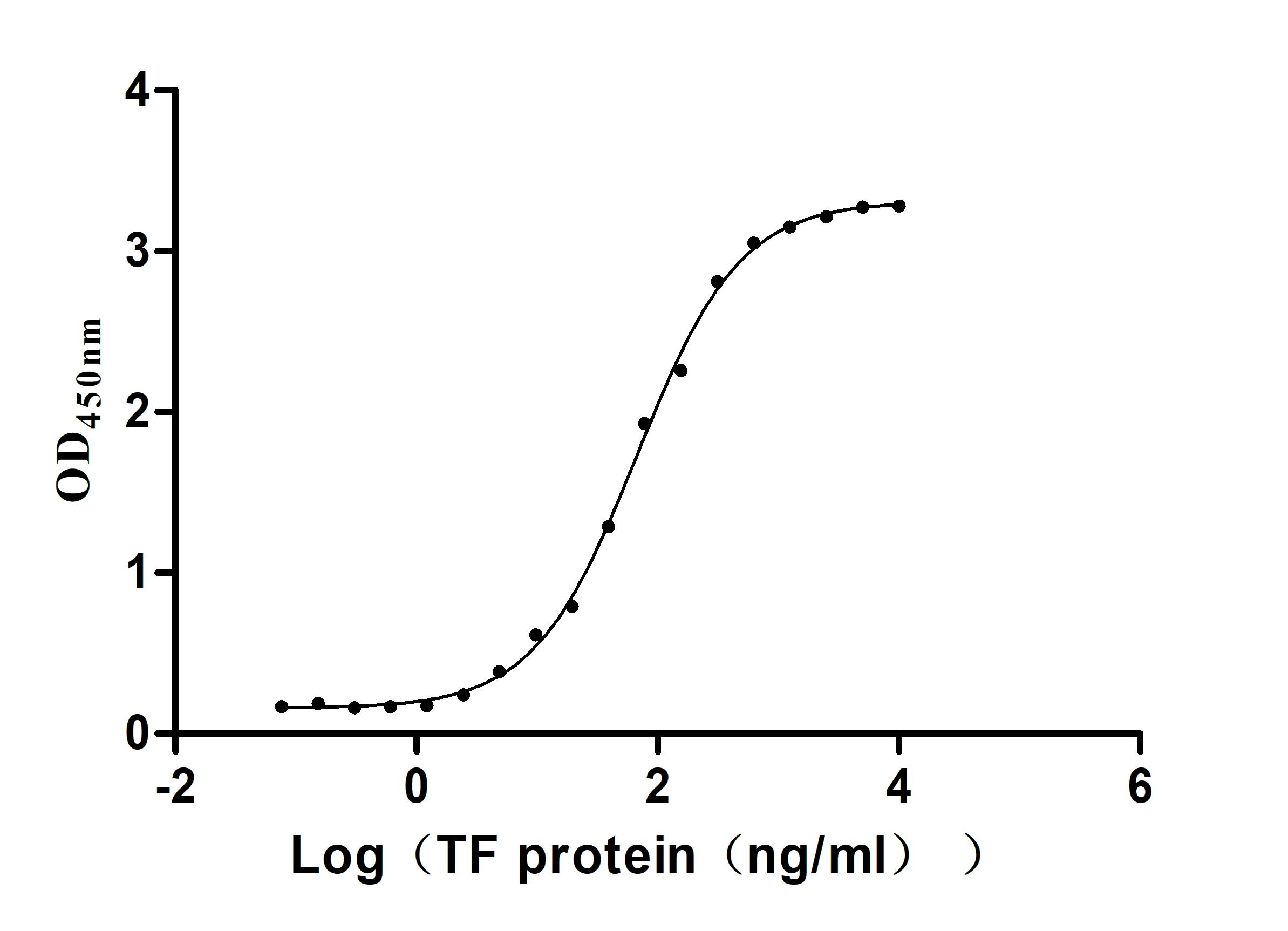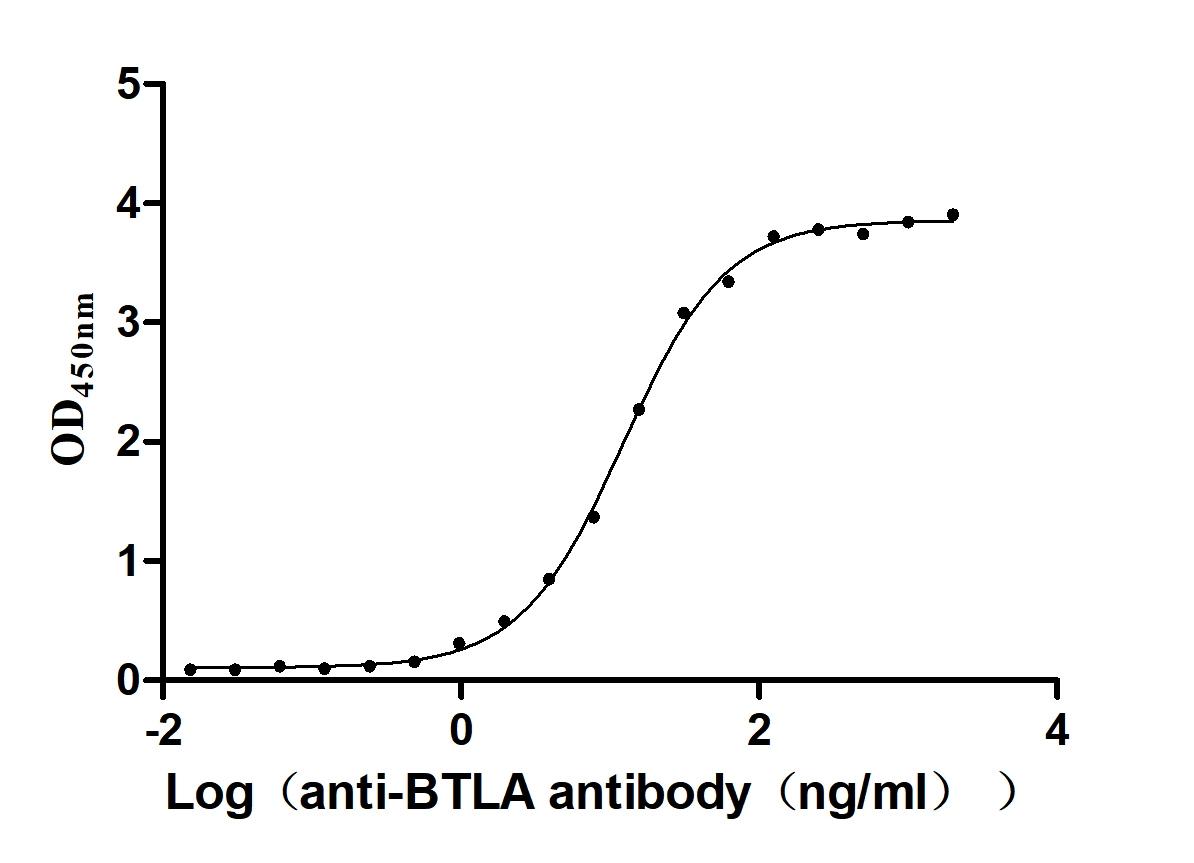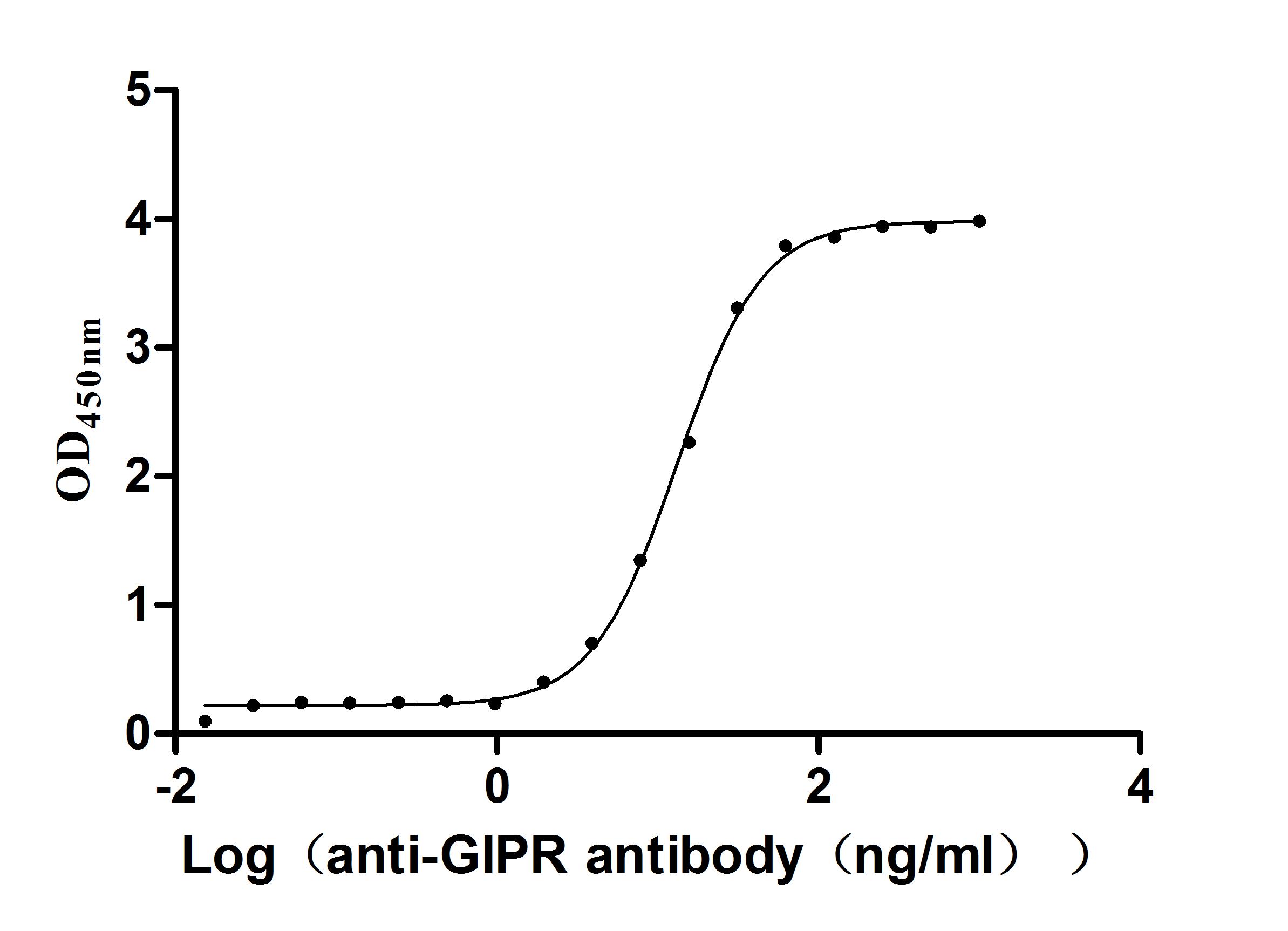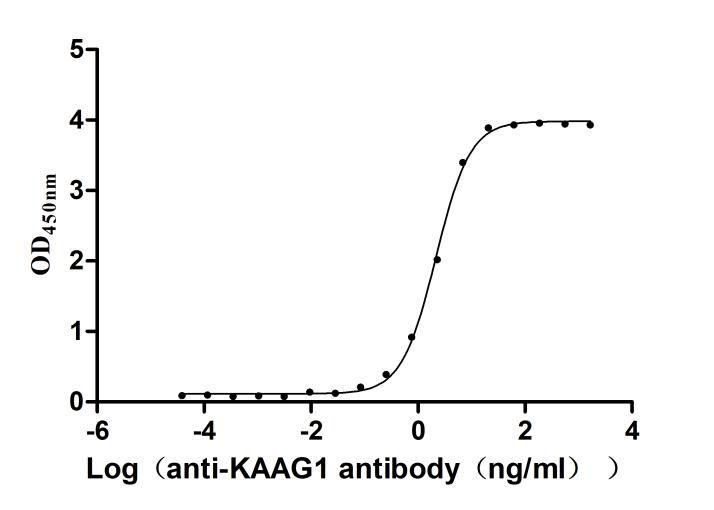Recombinant Mouse Lymphotoxin-alpha (Lta)
In Stock-
货号:CSB-EP013218MO
-
规格:¥1836
-
图片:
-
其他:
产品详情
-
纯度:Greater than 85% as determined by SDS-PAGE.
-
基因名:
-
Uniprot No.:
-
别名:Lta; Tnfb; Tnfsf1; Lymphotoxin-alpha; LT-alpha; TNF-beta; Tumor necrosis factor ligand superfamily member 1
-
种属:Mus musculus (Mouse)
-
蛋白长度:Full Length of Mature Protein
-
来源:E.coli
-
分子量:23.6 kDa
-
表达区域:34-202aa
-
氨基酸序列LSGVRFSAARTAHPLPQKHLTHGILKPAAHLVGYPSKQNSLLWRASTDRAFLRHGFSLSNNSLLIPTSGLYFVYSQVVFSGESCSPRAIPTPIYLAHEVQLFSSQYPFHVPLLSAQKSVYPGLQGPWVRSMYQGAVFLLSKGDQLSTHTDGISHLHFSPSSVFFGAFAL
Note: The complete sequence including tag sequence, target protein sequence and linker sequence could be provided upon request. -
蛋白标签:N-terminal 10xHis-tagged and C-terminal Myc-tagged
-
产品提供形式:Liquid or Lyophilized powder
Note: We will preferentially ship the format that we have in stock, however, if you have any special requirement for the format, please remark your requirement when placing the order, we will prepare according to your demand. -
缓冲液:Tris-based buffer,50% glycerol
-
储存条件:Store at -20°C/-80°C upon receipt, aliquoting is necessary for mutiple use. Avoid repeated freeze-thaw cycles.
-
保质期:The shelf life is related to many factors, storage state, buffer ingredients, storage temperature and the stability of the protein itself.
Generally, the shelf life of liquid form is 6 months at -20°C/-80°C. The shelf life of lyophilized form is 12 months at -20°C/-80°C. -
货期:3-7 business days
-
注意事项:Repeated freezing and thawing is not recommended. Store working aliquots at 4°C for up to one week.
-
产品描述:
The fusion tag N-terminal 10xHis tag and C-terminal Myc tag gene was added to the gene sequence corresponding to the E.coli of the mouse Lta protein to form the recombinant DNA. The recombinant DNA was cloned into the expression vector and then transformed into the E.coli for expression. Following purification, the product is the recombinant mouse Lta protein carrying N-terminal 10xHis tag and C-terminal Myc tag. The SDS-PAGE assessed the purity of this recombinant Lta protein up to 85%. It had an apparent molecular weight of approximately 24 kDa. This recombinant Lta protein may have applications in the research of Lta-associated cancer.
Lta is a gene providing instructions for making a protein named Lymphotoxin-alpha in mice and belongs to tumor necrosis factor family. This protein is a cytokine that in its homotrimeric form binds to TNFRSF1A/TNFR1, TNFRSF1B/TNFBR and TNFRSF14/HVEM. Reported diseases associated with LTA include Psoriatic Arthritis and Leprosy 4. Studies have reported that LT-alpha-deficient mice can generate antigen-specific CD8 T cells in response to infection with influenza A virus. Furthermore, various types of LTA have been reported to stimulate NO production in in vitro cultures of mouse macrophages, rat macrophages, and vascular smooth muscle cells.
-
Datasheet & COA:Please contact us to get it.
相关产品
靶点详情
-
功能:Cytokine that in its homotrimeric form binds to TNFRSF1A/TNFR1, TNFRSF1B/TNFBR and TNFRSF14/HVEM. In its heterotrimeric form with LTB binds to TNFRSF3/LTBR. Lymphotoxin is produced by lymphocytes and is cytotoxic for a wide range of tumor cells in vitro and in vivo.
-
基因功能参考文献:
- Lymphotoxin alpha has a role in regulating T cell clonal deletion by regulating thymic entry of antigen-presenting cells PMID: 29593265
- TNF/Lymphotoxin alpha/beta deficiency influences PM2.5 exposure-induced response of energy metabolism through alterations in both food intake and energy expenditure. PMID: 28917655
- Expression of LT alpha and beta on acinar cells in mice led to chronic pancreatitis and sufficed to reproduce key features of human autoimmune pancreatitis including the development of autoimmunity and AIP associated secondary extra pancreatic pathologies. PMID: 24508087
- These data highlight a previously undiscovered role of RORgammat(+) ILCs for NK cell development and define LT from ILCs as an essential molecule for the stromal microenvironment supporting NK cell development PMID: 24913234
- These data demonstrate that lymphotoxin-expressing cells, such as Th1 cells, mediate stromal keratitis. PMID: 23850656
- TNFalpha and LTalpha mediate post-myocardial infarction cardiac dysfunction via TNFR1 stimulation, whereas TNFR2 activation is cardioprotective against ischemic injury. PMID: 23704873
- findings show that soluble lymphotoxin alpha (sLTalpha3) produced by RORgammat(+) innate lymphoid cells controls T cell-dependent IgA induction in the lamina propria via regulation of T cell homing to the gut PMID: 24311691
- Data suggest that among many cytokines increased after myocardial ischemia/reperfusion (MI/R), lymphotoxin-alpha (Lta) is the only cytokine remaining elevated 24-72 h after reperfusion; LTa appears to suppress adiponectin expression following MI/R. PMID: 23360826
- study reports that mice deficient in lymphotoxin, a key molecule in gut immunity, were resistant to diet-induced obesity PMID: 22922363
- Data from lymphotoxin-alpha knockout mice suggest that lymphotoxin-alpha contributes to diet-induced weight gain and adiposity (leading to obesity) and is required to modulate accumulation of immune cells in adipose tissue (as in obesity). PMID: 22318945
- isolated a lysine-deficient mutant LTalpha, LT-K0, with almost identical bioactivity to that of wtLTalpha against mouse LM cells PMID: 21871814
- Grafts deficient in lymphotoxin-alpha have an attenuated capacity to induce graft-versus-host disease. PMID: 19789388
- LTalpha plays a significant role in lymphatic vessel function and in inflammation-associated lymphangiogenesis PMID: 20566898
- Our findings suggest a contribution of lymphotoxin alpha in the control of chronic M. tuberculosis infection. PMID: 20817877
- Data show show that targeted mutation of the lymphotoxin alpha (LTalpha) gene efficiently rescued tumor-reactive T cells, drastically reduced cancer incidence, and almost completely ablated metastasis. PMID: 19805094
- The organogenesis of nasal-associated lymphoid tissue (NALT) occurs independently of lymphotoxin alpha; however, the organization and recruitment of lymphocytes within NALT are dependent on LT alpha. PMID: 11801629
- Loss of lymphotoxin-alpha but not tumor necrosis factor-alpha reduces atherosclerosis in mice PMID: 11809756
- Control of experimental Trypanosoma brucei infections occurs independently of lymphotoxin-alpha induction. PMID: 11854219
- role in T-cell activation during an acute infection with lymphocytic choriomeningitis virus (LCMV) PMID: 11907234
- Locally up-regulated lymphotoxin alpha, not systemic tumor necrosis factor alpha, is the principle mediator of murine cerebral malaria. PMID: 12021316
- TNF-alpha and LT-alpha-deficient mice exhibit significantly improved morbidity and mortality during zymosan-induced MODS PMID: 12069182
- LT-alpha-deficient mice can generate antigen-specific CD8 T cells in response to infection with influenza A virus; however, appearance of the immune response is delayed for 2 to 3 days. PMID: 12391242
- Regulates spleen white pulp structure and function. (REVIEW) PMID: 12405187
- TNF-alpha and lymphotoxin-alpha are required for loss of BM B lineage cells during respiratory infection with influenza virus. PMID: 12444124
- microenvironment in peripheral lymphoid organs associated with lymphotoxin alpha/lymphotoxin beta-lymphotoxin beta receptor signaling and chemokine production is critical for recruitment efficiency of dendritic cells PMID: 12560241
- role in lymphoid organ neogenesis PMID: 12732657
- Formation of isolated lymphoid follicles (ILFs) in the small intestine is dependent upon LT; interactions of LT with its receptor LT beta-R are not required for ILF during gestation and can occur in adults. PMID: 12759424
- Compared with wild type mice, deficiency of lymphotoxin-alpha and/or TNF results in reduced production of inducible NO synthase, failure to control Toxoplasma gondii in the brain, and impaired toxoplasmastatic activity of macrophages. PMID: 12794148
- membrane LT-alpha is important in resistance to Theiler's virus infection PMID: 12882833
- Since Ltalpha is detrimental in inflammation and demyelination, but not necessary for remyelination and repair, inhibiting Ltalpha signaling may represent a promising strategy to treat MS. PMID: 15382206
- Lymphotoxin alpha- and lymphotoxin beta receptor-dependent interactions are required to initiate postnatal development of small intestinal lymphoid aggregates. PMID: 15585839
- Contributes to nasal-associated lymphoid tissue development and function through regulation of lymphoid chemokines and adhesion molecules. PMID: 15632007
- The lymphotoxin alpha signaling pathway is an essential effector pathway for host defense against the beta-herpesvirus muromegalovirus (MCMV). PMID: 15905567
- Blockade of the LT signaling pathway exacerbates the development and progression of collagen-induced arthritis, probably by skewing the Th1/Th2 balance that determines the outcome of autoimmune responses PMID: 16200624
- High cholesterol diet causes an abnormal metabolic phenotype (hepatic steatosis) in the absence of TNFbeta signal. PMID: 16406654
- The phenotype of the new LTalphaDelta/Delta mice indicates that LTalpha plays a smaller role in lymphoid organ maintenance than previously thought and has no direct role in the regulation of TNF expression. PMID: 16705172
- Data show that signaling of lymphotoxin (LT) alphabeta through the LTbeta receptor (LTbetaR) is indispensable for regulating peripheral but not thymic Valpha14i NKT cell numbers. PMID: 16751279
- Ectopic expression of type II collagen (CII)in medullary thymic epithelial cells and the corresponding central tolerance to CII are lymphotoxin dependent. PMID: 16785524
- Lymphotoxin alpha and tumour necrosis factor are not required for control of parasite growth, but differentially regulate cytokine production during Plasmodium chabaudi chabaudi AS infection. PMID: 17266742
- Expression of lymphotoxin-alphabeta on antigen-specific T cells is required for dendritic cell function. PMID: 17452522
- Lymphotoxin alphabeta2 (membrane lymphotoxin) plays a critical role in resistance to Leishmania major by promoting effective T cell-mediated anti-Leishmania immunity. PMID: 17911622
- A subtle function of the newly identified lymphotoxin alpha-Troy pathway is revealed in skin appendage development. PMID: 18202551
- The postnatal development of the splenic white pulp, involving the influx of T cells, depends on LTalpha1beta2 expressed by B cells. PMID: 18403646
- Data suggest that although lymphotoxin-alpha does not contribute significantly to the resistance and host responses of mice to airborne type A F. tularensis infection, it does play a subtle role in the multiplication/dissemination of F. tularensis. PMID: 18769490
- The adaptive immune system directly regulates liver regeneration via a T cell-derived lymphotoxin axis (LTalpha, LTbeta, LTbetaR). PMID: 18952083
- cigarette smoke induces pulmonary expression of lymphoid chemokines CXCL13 and CCL19 in a LTalphabeta-LTbetaR-dependent fashion PMID: 19164352
- both LTalpha and tumor necrosis factor are essential for the regulation of the granuloma, but they have distinctive roles in the recruitment of lymphocytes and maintenance of the granulomatous response during chronic M. leprae infection. PMID: 19246648
- LTalpha(1)beta(2) and LTbeta receptor signals control development and maintenance of the mature marginal sinus(MS)structure and implicate MAdCAM-1 in the structuring of the MS endothelial cells that is important for movement of immune cells in the spleen. PMID: 19303389
- Sustained LT signaling represents a pathway involved in hepatitis-induced hepatocellular carcinoma. PMID: 19800575
显示更多
收起更多
-
亚细胞定位:Secreted. Membrane.
-
蛋白家族:Tumor necrosis factor family
-
数据库链接:
KEGG: mmu:16992
STRING: 10090.ENSMUSP00000025266
UniGene: Mm.87787
Most popular with customers
-
Recombinant Human R-spondin-1 (RSPO1), partial (Active)
Express system: Mammalian cell
Species: Homo sapiens (Human)
-
Recombinant Mouse Transthyretin (Ttr) (Active)
Express system: Mammalian cell
Species: Mus musculus (Mouse)
-
Recombinant Human Cell adhesion molecule 1 (CADM1), partial (Active)
Express system: Mammalian cell
Species: Homo sapiens (Human)
-
Recombinant Human Serotransferrin(TF) (Active)
Express system: Mammalian cell
Species: Homo sapiens (Human)
-
Recombinant Human B- and T-lymphocyte attenuator(BTLA), partial (Active)
Express system: Mammalian cell
Species: Homo sapiens (Human)
-
Recombinant Macaca Gastric inhibitory polypeptide receptor(GIPR), partial (Active)
Express system: yeast
Species: Macaca fascicularis (Crab-eating macaque) (Cynomolgus monkey)
-
Recombinant Human Kidney-associated antigen 1(KAAG1) (Active)
Express system: E.coli
Species: Homo sapiens (Human)

